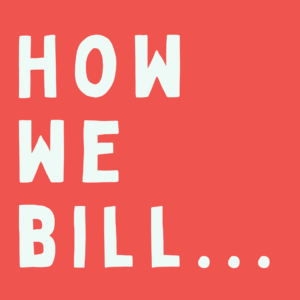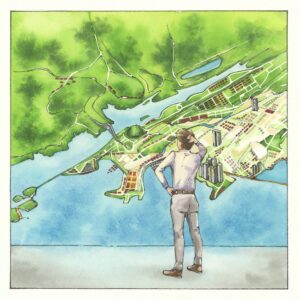Red flags just look like regular flags when viewed through rose-colored glasses. So you should make a habit of running due diligence before any new investment or business venture.
Investing in real estate is fun and exciting. But don’t let all the dopamine distract you from asking the important questions to protect yourself and your investment.
Due diligence is a broad term.
“Due diligence” is a term that gets used in a lot of different contexts.
- In Panama you may be asked to complete “Know Your Client” documents for your bank or your lawyer to comply with increasingly stringent regulations.
- An investor in a company or fund will usually run a financial due diligence to assess the health of the target company’s balance sheet.
- You engage in a type of due diligence when you seek out references about a which car to buy, which neighborhood to live in, or which internet provider to use.
- Actually, even poking around on your attorney´s blog could be considered part of a due diligence process.
This article is not about any of those. Rather, this article is about due diligence as it pertains to real estate investments in Panama.
But due diligence sounds dry and boring.
Well, not everything in life is about having a good time. And if it helps then you could think of due diligence as a game, where you are a clever detective spotting all the clues.
Look, buying a real estate property is often a sizeable investment. It is important to know what you are buying and that you will be reasonably able to execute your plans for the property.
Also, not every due diligence finding is a deal breaker. Real estate is full of anomalies, irregularities and unique circumstances. In fact, this is where a lot of people find opportunities to make massive returns on real estate investments. If your due diligence identifies any issues then you can decide whether to accept them, to allow the seller to resolve them, or to account for them in the deal terms.
We aren’t intimidated by issues, but we prefer not to be surprised after investing.
Does the property meet your expectations?
This question is at the heart of any real estate due diligence process. I usually recommend that investors think about due diligence from 3 different angles: Commercial, Technical and Legal.
Commercial Due Diligence
Nobody wants to pay above market price. So hopefully you’ve looked around, seen other options and review comparable listings for similar properties. Even better if you have access to details of any real transaction. You want to understand the market where you are investing.
If you have commercial plans for the property, then you should also look for comps to support your expectations.
- If you are looking for an investment property that can generate a 6% annual return, then you don´t want to buy a $200k apartment in an area where similar apartments are renting for $500 per month.
- Imagine buying and furnishing the perfect AirBNB apartment, only to find out that the residents in the condominium hate short-term rentals and that HOA strictly prohibit that sort of thing.
- Or how about the fact that coffeeshop just below the apartment turns into late-night DJ parties Thursday-Sunday. Wouldn’t that have been nice to know when you invested?
This part of your due diligence will require you to be a little bit inquisitive and creative. You will need to get out there, observe what is going on and talk with some folks.
Technical Due Diligence
Is there any particular detail about the property, the neighbors or the surrounding area that could impact your plans for the property? This becomes especially important if you are planning to do construction or renovations, and it can also be relevant for commercial properties.
Here are some examples of what I mean:
- Regulations limiting what can be built on a property (e.g. height restrictions, density limitations, historic properties).
- Proximity to a church, or municipal zoning that limits the types of businesses that can operate on a commercial property (e.g. limited commercial zoning designations).
- An easement grant some type of protected specific access to a neighbor.
- The underlying soil or proximity to the water table could have a costly impact on the foundations required for a new construction.
- The plumbing could be deteriorated, or the wooden floors could be eaten up by termites, or the roof may need to be replaced. The structure of the property may be compromised. These things can be expensive to resolve.
- Ambiguity about lot lines could leave room for some type of dispute with a neighbor.
- The property may contain built structures or improvements that haven´t been declared with the tax authorities.
These are the types of questions that are best answered by professionals (architect, construction contractor, or some can be answered by a lawyer).
Legal Due Diligence
This is usually where I get involved.
Put simply, we want to be sure the person the person acting as the seller is legally in a position to transfer the property and that there will not be any potential limitations to your ownership and enjoyment of the property once it is yours.
Some examples of red flags I have seen come up in due diligence:
- The property being acquired has been passed along from one family generation to another in the sellers’ family, and its ownership is now split a group of disjointed second cousins who don´t really like each other. My client’s transaction could be impacted if one of the cousins doesn´t want to sell, or doesn´t like the price, or has an ongoing legal dispute with one of the other owners. We account for this in the Promissory Purchase-Sale Agreement.
- The property being acquired has a special type of rule (called a “marginal”) that designates a particular use for a property. The marginal is attached to the property and appears in Panama’s Public Registry, specifying that the property has been designated to be developed government subsidized low-income housing. The Seller is aware of the marginal and is taking steps to lift it, so we make sure to account for this obligation in the Promissory Purchase-Sale Agreement.
- In Panama, each property is identified with a parcel (“finca”) number, which usually includes any improvements built on the property as well as the dirt underneath. But during due diligence, we discover that the parcel number for the property my client is only represent the improvements built on a property. The underlying dirt belongs to the Panama government. My client may be able to acquire the land from the government separately, but the process and price is uncertain. My client may choose to withdraw from the transaction and avoid buying a problem.
- The size of the property is uncertain, because two different numbers appear in Panama’s Public Registry vs. the land authority (“ANATI”). This is often just the result of a typo on one side or the other, or it could be indicative of a potential ambiguity with respect to the lot lines. The Seller commits to contracting a surveyor to resolve the issue and ensure that there we avoid any potential future land dispute with a neighbor.
- The property or the seller is caught up in a lawsuit related to a loan the Seller took a few years ago. We set the transaction timeline in a way that the lawsuit must be resolved as a condition to close.
Your legal due diligence should take a look at the property itself, but it could also extend to the Seller. Most of the base due diligence takes place on Panama’s Public Registry, but some investors choose to pursue a much deeper due diligence depending on the transaction.
Bottom Line?
When it comes to successful real estate investing it helps to have patience, vision, and a lot of grit. But don´t just listen to your heart. There is a lot of inventory out there right now, and you owe it to yourself to be a discerning investor.
I challenge you to approach due diligence not just to tick boxes. Step back and ask yourself if there are any type of particularities of your target property could impact your plans. Talk with the neighbors, engage with other expats about their experiences and work with recommended local professionals.
You are your own best advocate, so proceed with caution. The name of the game is “skeptical optimism”. Or “optimistic skepticism”. Anyway, you know what I mean.
Write to me about your real estate transaction, and let’s take a look under the hood!







